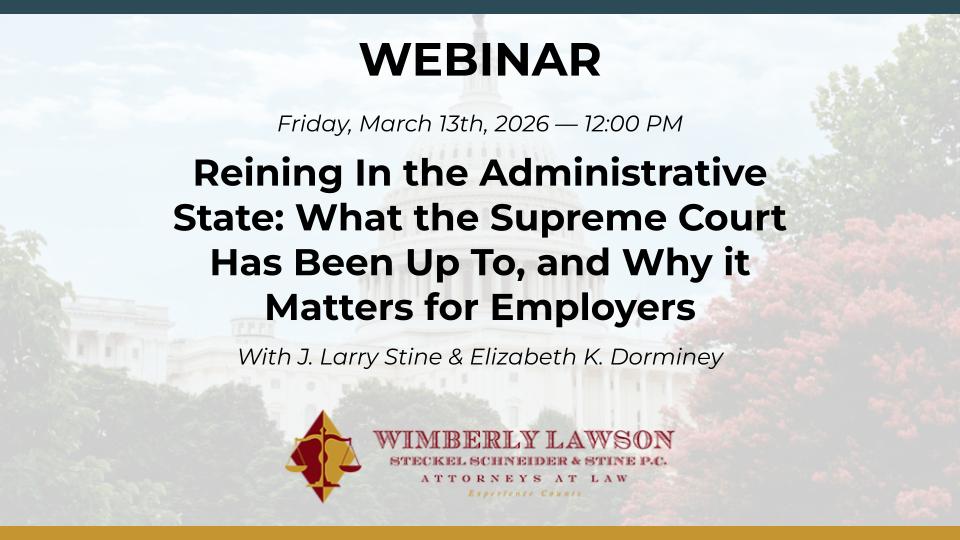NEW DUELING RULINGS SUGGEST THAT OBAMACARE MAY GO TO THE SUPREME COURT AGAIN
Obamacare and the related regulations have generated much litigation, including two U.S. Supreme Court decisions. The Supreme Court ruled in a case brought by 26 states and others that requiring individuals to pay a penalty for not having health insurance is constitutional as a tax. The Supreme Court also ruled in the Hobby Lobby case that the federal government could not require a closely-held corporation to provide drugs that cause abortions as a health benefit if the employer has religious objections to doing so. It now appears that another issue may be decided by the Supreme Court.
Federal law provides that certain individuals who purchase health insurance coverage in an Exchange established by the State may claim a tax credit. According to this language, the tax credit is not available for those individuals who purchase health insurance coverage through any other source, including an Exchange established by the federal government. The legal consequence of this interpretation is that many employers in States who do not establish Exchanges will not be subject to employer penalties, even if they do not offer minimum essential coverage that is affordable and that provides minimum value.
Because many States (approximately 34) chose not to establish Exchanges, the IRS issued a regulation that expanded the availability of the tax credit to those individuals who purchase health insurance coverage in an Exchange established by the federal government. The effect of the IRS regulation is that the tax credit is available without regard to whether the Exchange was established by a State or by the federal government. As a result, the IRS appears to contemplate that all employers with more than 50 full-time equivalent employees will be subject to employer penalties, even if the States in which the employers operate do not establish Exchanges.
On Monday, July 22, 2014, a three judge panel of the Court of Appeals for the District of Columbia Circuit (which decides many challenges to agency rulings and regulations) and a three judge panel of the Court of Appeals for the Fourth Circuit (which covers Maryland, North Carolina, South Carolina, Virginia and West Virginia) issued conflicting decisions about whether the IRS regulation is a valid interpretation of the law. In Halbig v. Burwell, the D.C. Circuit invalidated the IRS regulation because the plain language of the law limited the availability of the tax credit to those individuals who purchase health insurance coverage in an Exchange established by a State. In contrast, the Fourth Circuit upheld the IRS regulation in King v. Burwell by concluding that the IRS regulation was a permissible interpretation of an ambiguous law.
There is speculation that the losing party in each Circuit will ask for a decision by all the judges in that court. For example, the federal government might ask all of the judges assigned to the D.C. Circuit to review the decision issued by the three judge panel. Given the U.S. Senate's recent action to reduce the number of votes needed to approve a judicial appointment, given the addition of three Obama appointees to the D.C. Circuit because of the Senate's action, given that the D.C. Circuit now has seven members appointed by Democrat presidents and four appointed by Republican presidents, and assuming that the D.C. Circuit agrees to review by all of the judges, it is likely that the entire panel will uphold the IRS regulation. Given the appointments to the Fourth Circuit in the last five years and the current composition of the Fourth Circuit, it also is likely that the entire panel will uphold the IRS regulation.
Ordinarily, the U.S. Supreme Court will not decide an issue unless there is a conflict among the Courts of Appeal. Accordingly, if the D.C. Circuit and the Fourth Circuit reach the same conclusion, it is unlikely that either case will be accepted by the Supreme Court. However, the same issue is being considered by district courts in other circuits, which means that a conflict among the circuits is possible in the future, even if the D.C. Circuit and the Fourth Circuit ultimately agree.
What should employers do in response to these conflicting decisions? For the time being, employers should continue with their plans for complying with Obamacare and the related regulations recognizing that Obamacare and the related regulations will be the subject of litigation for the next few years.
Related Content
Get Email Updates
Recent Content

Reining In the Administrative State: What the Supreme Court Has Been Up To, and Why it Matters for Employers

TPS Update (as of 2/6/2026)

Job Interviews Can Be a Good Selection Device

Suggestions on How to Diffuse a Tense Situation

Employers Blame Unions for Recent Shutdowns

